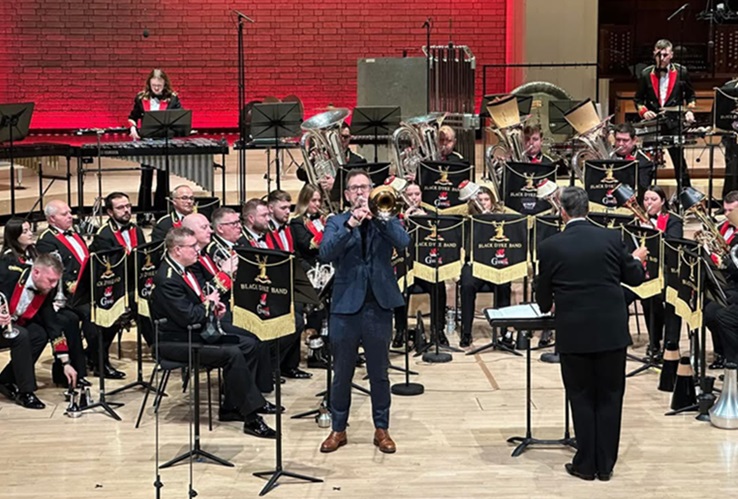
Conductors: Prof Nicholas Childs, Andrea Price
Soloists: David Childs, Ian Bousfield
2025 RNCM International Brass Band Festival
Saturday 25th January

A brace of stunning concerto performances added a level of superlative to Black Dyke Band’s appearance at the RNCM Festival.
David Childs and Ian Bousfield have both performed here in recent years, although any familiarity on show was their level of intoxicating musicianship. The Queensbury band did not trail in their wake either in providing a reaffirmation of their musical credentials. It was music making of the very highest quality.
Life force
Peter Graham’s ‘Force of Nature’ saw David Childs embrace the extraordinary life force of writer Ernest Hemingway – the opening flourish of the ‘Matador’ cadenza the ornate signature of the bull fighter; a balletic sword wielding killer, the beauty and precision of his colourful movement under the hot Madrid sun belying the true cold nature of his work.
a balletic sword wielding killer, the beauty and precision of his colourful movement under the hot Madrid sun belying the true cold nature of his work.
The ‘Wayfarer’ spoke of the deep melancholy that affected Hemingway throughout his life – the key, the frustration that fate denied him the opportunity to test himself in the heat of battle (he was injured in a mortar explosion whilst driving an ambulance van). The simple lines of the musical prose were etched with loss and emptiness.
For the rest of his life, he took risks; the open sea and thrill of the chase shown in ‘Pilar’ to close – the soloist at the helm as the boat crashed through the waves with virtuosic abandon. You could feel the brine on your face and the pull of a leviathan marlin on the rod - the old man and the sea as one in reliving his youth through the soul of a kindred musical spirit. It was a stunning performance.
Statement defining
The same communal satisfaction was felt after Ian Bousfield’s statement defining interpretation of Gregson’s ‘Trombone Concerto’. An academic treatise became a remarkable first-person narrative – the solo voice drawing on a huge arc of expression and technique, from the tiniest inflection to the grandest gesture, a wink here, a swagger there.
An academic treatise became a remarkable first-person narrative – the solo voice drawing on a huge arc of expression and technique, from the tiniest inflection to the grandest gesture, a wink here, a swagger there.
15 years after he should have first performed it, Bousfield returned to hallmark it with his own mesmeric imprimatur. It was totally compelling - a tour-de-force of huge magnitude.
Intensity
Throughout, Prof Nicholas Childs had expertly dimmed the ensemble spotlight in accompaniment. It was however shone with formidable intensity with their brace of major works.
An absorbing take on Philip Wilby’s ‘Astralis’ became a journey of wonderment into the heavens (complete with choreographed images), whilst the more earthly, but no less majestic appreciation of man’s relationship to creation was presented in Gregson’s ‘Of Men and Mountains’
An absorbing take on Philip Wilby’s ‘Astralis’ became a journey of wonderment into the heavens (complete with choreographed images), whilst the more earthly, but no less majestic appreciation of man’s relationship to creation was presented in Gregson’s ‘Of Men and Mountains’.
Both were crafted with mature, insightful consideration.
Subtle call
Elsewhere, the more commercial canvas of ‘Fragile Earth’ by Sir Karl Jenkins (who was in attendance) cleverly made its point without ever resorting to a call for sloganized ‘Stop Oil’ activism, leaving Andrea Price’s subtle call for reflection in her short but pointed ‘And Earth Raised up Her Head’ to leave a more telling impression on the mind (as did her conducting).
Jacob Larsen’s upbeat ‘Ad Astra’ had earlier opening the evening with a flourish. It ended in the same manner with the MDs very personal tribute to the genius of Elgar Howarth with ‘Pavanne’ and ‘King’s Hunting Jig’ from his ‘Music from the Elizabethan Court’.
Iwan Fox









